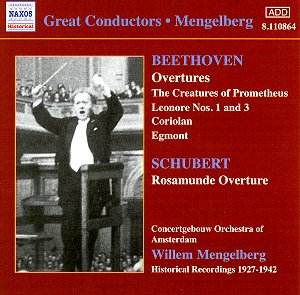When
I reviewed an earlier recording in this series of transcriptions
by Mark Obert-Thorn I hoped that more would be forthcoming from
this source, and here it is - a selection of recordings of Beethoven
and Schubert by the Concertgebouw Orchestra under their then conductor
in chief, Willem Mengelberg.
Many
music lovers will have heard of Mengelberg’s habit of glissandi
in inappropriate places, plus pulling the music out of shape and
ruining the structures built in by the composers. Whilst this
might be true for the large romantic works of Strauss and Tchaikovsky,
it certainly isn’t so for Beethoven.
What
we have here are superb transfers made of studio recordings played
absolutely straight, with only an absolute minimum of rythmic
distortion. Before you might think that this leads to boredom,
let me assure you that these performances are as vital as anyone
could hope for. In a few of the tracks, the Creatures of Prometheus
for example, we hear the lovely fluid woodwind sound, for which
the Concertgebouw was famous, and which was further developed
by Mengelberg’s successor, Eduard van Beinum (who also, for example,
made a superb recording of Prometheus with the LPO).
This
is not just the more familiar Overture, but also included are
the Allegretto and Finale from the incidental music, the former
familiar to anyone who knows the Eroica (last movement), or both
from the Contradanses.
When
we reach the more substantial overtures we have the favourite
items much loved by conductors, orchestras and record companies
alike. In these performances, only those looking for the latest
in modern digital sound are likely to be disappointed. The sound
quality in these transfers is by definition, fairly basic, but
quite easily listenable to as are others in this series. The basic
thing that helps the transfer engineer in his quest for good sound
quality is the balance of the original 78 rpm recordings. Mengelberg
was a master of this art, and not only could he achieve this balance,
he also had perhaps the best trained orchestra in Europe at the
time, maybe even the world. In addition, he could conjure up the
sense of a live performance in the studio, as could some but not
others.
The
two Leonore Overtures are very exciting and played almost to perfection,
there being tiny bits of glissandi in the allegro section of No.
1. In No. 3, the very bright Concertgebouw trumpets come over
a treat in the alarm call as they do in the coda of Egmont.
Concluding
this release we have the Ruins of Athens Overture, the scherzo
from Beethoven No. 8, and two short works by Schubert. These versions
are historically incorrect but sound more like some modern performances,
but with the life left in.
Another
superb historical issue from Naxos – More please.
John
Phillips
